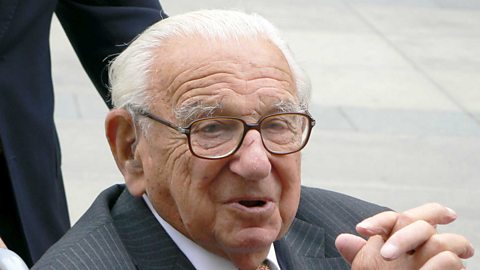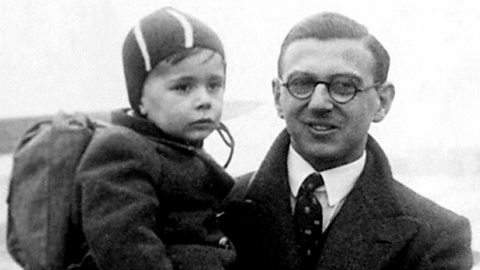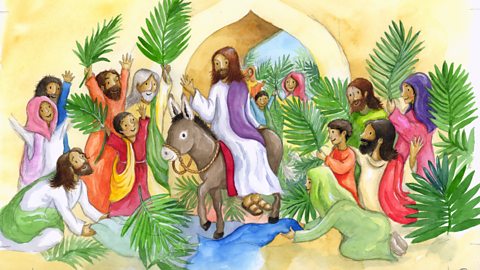Gemma continues her exploration of what it means to be a 'hero'. She hears more from Barbara Winton about the life of her father, Sir Nicholas Winton, and how he was able to arrange the rescue of 669 children from Prague in the months immediately before the outbreak of World War 2. Photo credit: Li-Sung.
Before the programme
- Previous programmes have explored different types of hero. How might Sir Nicholas Winton have heroic qualities?
- Have you ever had to spend time away from your family? How did it feel? How long were you away?
- Talk together about what you think might happen next in the story of Nicholas Winton and the ŌĆśkindertransportŌĆÖ. What dangers might they and the children face?
- In todayŌĆÖs programme we meet some of the children who Sir Nicholas Winton rescued, many of whom are old themselves now. What stories do you think they might share?
Click to display the image full size

Story synopsis:
Setting to work, Nicky writes to dozens of organisations - eg newspapers - asking for foster families and financial guarantors to come forward to help. In Prague, Trevor Chadwick, a British schoolmaster, assists by putting together the lists of endangered children and supervising their their departure. 669 children are rescued, but on 1 September the largest group of children are not allowed to leave: Germany has invaded Poland and World War II is about to begin.
After the story:
- How should Nicky feel at the end of the story - ŌĆśsadŌĆÖ, ŌĆśproudŌĆÖŌĆ”or both?
- Talk about the people who helped Nicky and made ŌĆśhisŌĆÖ story possible (eg Doreen Warriner, his mother, Trevor Chadwick, Martin Blake).
- How is Sir Nicholas Winton different to some of the other heroes/superheroes weŌĆÖve explored?
- The story of ŌĆśWintonŌĆÖs childrenŌĆÖ finally became known following an episode of the TV programme ŌĆśThatŌĆÖs lifeŌĆÖ with Esther Rantzen in 1988. Nicholas Winton is a guestŌĆ” but is unaware that sitting all around him are the ŌĆśchildrenŌĆÖ he has rescued.
Follow-up activities:
- Research some stories from the lives of survivors to use to write a diary entry (or similar) as if you are a child escaping from Prague. There are lots of photos on the internet that you could use for inspiration and stories from the lives of the children themselves, such as those on the , including photos of objects treasured by six of the survivors.
- Use luggage labels to represent some of the children you have found out about during these two programmes. Write on each one details that you have found out about them and create a memorial display somewhere in school to help to remember this event in world history.
- The ŌĆśone small thingŌĆÖ challenge: you donŌĆÖt have to be a hero to make a difference. Try doing one small thing for someone else, even anonymously, and see what a difference it can make.

KS2. Holocaust Day. Unsung heroes: Sir Nicholas Winton part 1. audio
Gemma considers what it takes to be a hero: do you always have to be 'brave'? Included is the first part of the story of Sir Nicholas Winton, told for us by his daughter, Barbara.

KS2. Mothering Sunday. audio
Gemma looks forward to celebrating Mothering Sunday and finds out about its history.

KS2. Easter. audio
Gemma looks forward to celebrating the festival of Easter and the end of the Spring term.

